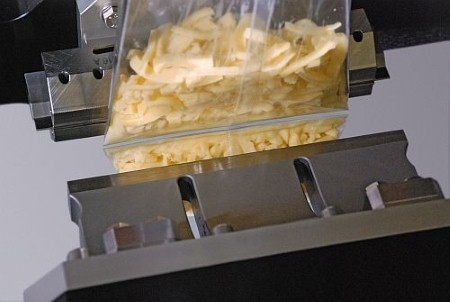 he potential to deliver fully repeatable, almost reject-free cheese packaging despite seal contamination. In addition output can be increased due to short cycle times. Ultrasonic specialist Herrmann Ultraschall has marketed the technology with successful installations in Europe and North America.
he potential to deliver fully repeatable, almost reject-free cheese packaging despite seal contamination. In addition output can be increased due to short cycle times. Ultrasonic specialist Herrmann Ultraschall has marketed the technology with successful installations in Europe and North America.Ultrasonic sealing is a fast and repeatable method for joining flexible packaging materials. It generates a true molecular bond with high strength and a reliably consistent hermetic seal by converting electric voltage into mechanical vibrations and inducing them into the film by a sealing tool, called sonotrode. The packaging material literally welds together with heat generated by the ultrasonic frequency of 20, 30 or 35 kHz. However, the tools stay almost cold and the heat develops inside the material. The technology is therefore particularly suited for heat-sensitive products.
Ultrasonic vibration shakes away product residues from seal area
The high vibration used in the ultrasonic process has an added bonus for products with fines in the seal area like shredded, grated or powdered cheese: it “shakes away” any food product from the seal area that may enter and possibly compromise a hermetic seal. This is the primary benefit over the traditional heat-sealing where producers battle with leakers caused by defective seals and related issues like moisture loss or mould.
Another advantage is the quality control: the ultrasonic generator compares each seal made with preset values. If the inline seal falls outside established limits, the machine control sends a message and pouches are automatically rejected or the operator can stop the line.
Cheese film and pouch materials, originally developed for heat-seal applications, are in the process of being optimized for the new technology. The reason: ultrasonics requires less costly, while thinner materials without heat shield.
OEM and Retro-fit for packaging machinery
Herrmann Ultraschall works with various packaging equipment manufacturers when integrating ultrasonic sealing modules, however, the ultrasonic process presents design challenges that might require machine design enhancements and modifications such as a more robust jaw carriage for more stability. Ultrasonic sealing systems are more expensive than heat-sealing systems. Yet payback can occur in a range of 6 to 18 months, due to savings generated by reduced packaging material, waste reduction, productivity gain and energy reduction. Total cost of ownership, also a key purchase decision factor, could be reduced using ultrasonic sealing compared to traditional heat sealing technology. This is particularly true in a multi-shift, high production “24/7” 365 day environment. HFFS, VFFS, lap seal and fin seal applications are all suited for ultrasonic sealing.





